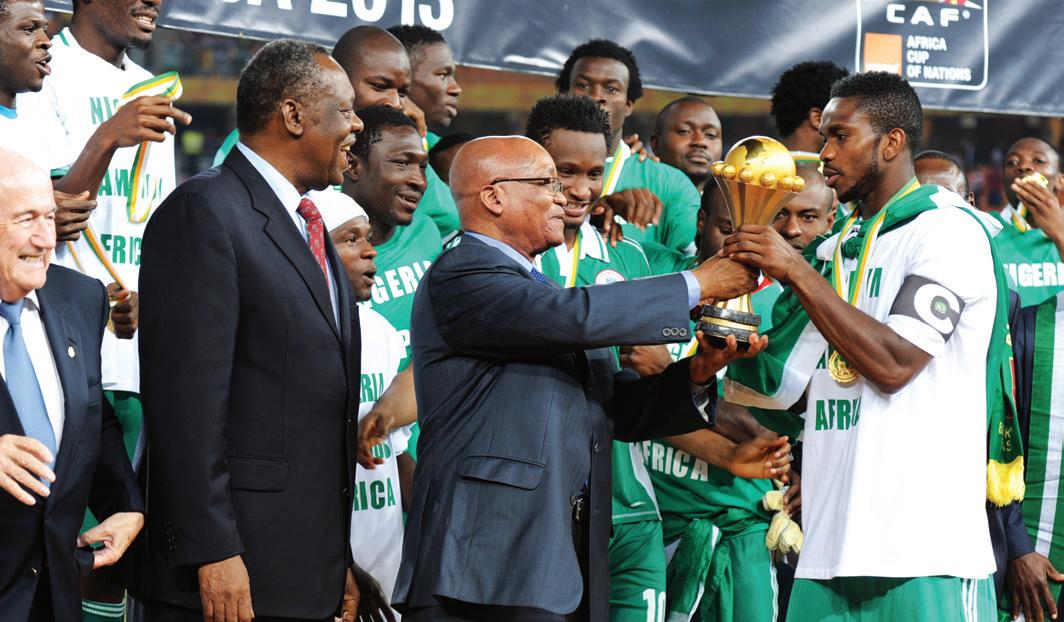
2 minute read
TheAfrican Soccer Showpiece: Some interesting facts
from Spotong Issue 4
by 3S Media
been eliminated in an Afcon quarterfinal match against Mali. In 2002, when Mali hosted the continental showpiece, they beat Bafana Bafana 2-0 in the quarter-finals. Bafana were the first to score through pacey striker Tokelo Rantie in the 30th minute following a brilliant combination initiated by midfielder maestro May Mahlangu and Thuso Phala. However, Bafana Bafana head coach, Gordon Igesund was forced to substitute Rantie after he sustained an injury. He was replaced by Lehlohonolo Majoro. South Africa’s chances to win the Africa Cup of Nations may be slim according to many pundits, but celebrated former Coach Clive Barker doesn’t believe the national side will falter during their quest to become champions of Africa. With the final 23-man squad set thousands of South Africans are entering into discussion surrounding the national team’s recent performances and whether or not Bafana Bafana are able to recapture the glory of 16 years ago. However, the face of African football has changed since 1996, where only a handful of household names could be found plying their trade in Europe’s elite clubs. The competitiveness inherent in African football in 2013 is stronger than in 1996 when Bafana Bafana won their maiden continental championship. This means the task ahead of the national side is only tougher, even though they are playing at home once more, they will be facing teams which have talent beyond their own.
“Football is now an oyster and almost every top side has an African player in it,” Barker told Spotong. “African football has evolved and improved. The great personalities in African football have transformed the game. There are collectively a lot more talented players than in 1996.”
Advertisement
Barker recognises the transformation of African football but will not discount South Africa’s chances to win the tournament in future. His fervent belief in the team may not be shared by many, but the former national coach has confidence in Gordon Igesund to turn the team around.
THE AFRICAN SOCCER SHOWPIECE
Some Interesting Facts
Africa’s biggest soccer showpiece, Orange Africa Cup of Nations (AFCON) was first held in 1957 organised under the auspice of the Confederations of African Football (CAF). The founding members are Egypt, Sudan, Ethiopia and South Africa. But South Africa was disqualified due to the policies of the then apartheid government. Since then the tournament has grown greatly, with 16 nations competing for the championship. Egypt is the most successful nation in the history of AFCON, having won the tournament seven times (including when Egypt was known as the United ARAB Republic between 1958 and 1971). Ghana and Cameroon have both won the title four times. The Bafana Bafana’s class of 1996 made history when they became the first team from the Southern African region to win the prestigious title 17 years ago under the mentorship of Clive Barker. That was two years after the country was re-admitted to the international football competition following the demise of apartheid in 1994. Zambian national side, Chipolopolo won the country’s maiden AFCON title after playing in their third final last year. The tournament had previously been dominated by the Northern and Western African countries. Winning the 1996 AFCON earned Bafana Bafana the number one ranking on the continent and 16th on the FIFA’s world ranking. Who can forget the 1996 epic final when the ‘Boys’ trounced the Tunisian side two-nil with Mark Williams, who came on as a substitute, turning into a two-goal hero?










